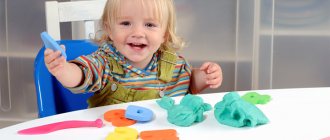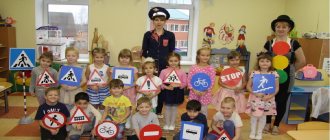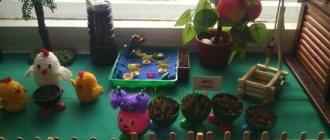Children's and adult mathematics project "Journey to the land of fun mathematics"
Project duration (time of project work): 7 weeks.
Project participants: Children of primary preschool age (1st group), teachers, parents.
Educational area: social-communicative, cognitive, speech, artistic-aesthetic, physical.
Relevance: Within the framework of the Federal State Educational Standard it is stated that the problem of mental education of preschool children, the basis of which is sensory education, is of great importance. A child’s sensory development is the development of his perception and the formation of ideas about the external properties of objects: their shape, color, size, position in space, as well as smell, taste, etc.
The task of upbringing and education at an early age is to develop and maintain the activity of each child, to evoke his desire to act, communicate, play, and solve practical problems.
During the observations, it was revealed that not all children have developed the perception and formation of ideas about the external properties of an object.
In order to provoke and support cognitive activity, to interest the child in a mysterious object and to encourage independent experimentation, I chose the theme of the project “Journey to the Land of Fun Mathematics.”
Hypothesis: The organization of game exercises to distinguish the number, size, shape of objects and the development of spatial orientation creates the necessary basis for the successful formation of cognitive actions and skills at the next age stages of the child’s development.
Project goal: Creating favorable conditions for the formation of elementary mathematical concepts in children of the first junior group.
Project objectives:
- Replenishing the developmental environment of the mathematical center with games and aids created jointly with parents;
- To instill in children an interest in knowledge of mathematics;
- Reinforcing the concepts one, many, big, small;
- Formation of ideas about the concept of none;
- Formation of ideas about the shape of an object (circle, square, triangle);
- Formation of perception of spatial relationships;
- To promote the development in children of attention, intelligence, ability to think logically, reason, and draw conclusions;
- Expansion of passive vocabulary, activation of speech;
- Development of speech breathing;
- Creating a friendly team of children and parents.
Project support:
Methodological: I.S. Pogudkina “Educational games, exercises, complex activities for young children.” From the experience of working on the “Childhood” program.
Diagnostic and didactic: Fiction, illustrations.
Expected result:
- The child shows cognitive activity;
- The child compares, classifies and reflects the results in speech;
- The child has an idea of shape, color, size, quantity;
- A friendly connection is established between the child, parent and teacher.
Project activity products:
- A system of classes that includes a variety of games and exercises aimed at developing mathematical concepts;
- Card index of didactic sensory games for children 2-3 years old;
- Album “Learning colors”;
- Application “Gift for Mishutka”;
- Consultation for parents “Fun math at home”;
- Sensory games (teachers and parents): Panel “Underwater World”, Didactic game “Rest the nesting dolls”, “Magic meadow”, “Help the hedgehog”, “Pick up a shoe”, “Find a house for the figure”, “Open a fairy tale”.
- Photo collage “Journey to the land of fun mathematics.”
Project implementation work plan
| Stage | Action, event | Participants responsible | Result | Deadlines |
| Stage 1: preparatory |
| Educator | Identifying the problem | 1 Week |
| Educator | Methodological support for the project | ||
| Educator | Diagnostic and didactic support for the project | ||
| Educator | Analysis of results, solutions | ||
| Educator | Environment for the project | ||
| Educator | Help parents teach their child mathematical concepts at home | ||
| Stage 2 (basic, formative, practical) |
| Parents | Album “Learning colors” | 2 week |
| Educator | Card index of didactic games on sensory | ||
| Teacher Parents | Didactic sensory games | ||
| Teacher Children | Lesson notes (Appendix No. 1) | 3 week | |
| Teacher Children | Application “Gift for Mishutka” | ||
| Teacher Children | Ability to act in concert | ||
| Teacher Children | Compliance with the plot of the game, the ability to negotiate, creating a game environment, fixing primary colors | ||
| Teacher Children | Interest in reading fiction, ability to draw conclusions from what is read | ||
| Teacher Children | Mastering water play techniques | ||
| Teacher Children | Development of thinking, memory, visual perception, fine motor skills | ||
| Teacher Children | Lesson notes (Appendix No. 2) | 4 week | |
| Teacher Children | Development of fine motor skills | ||
| Teacher Children | Interest in reading fiction, ability to draw conclusions from what is read | ||
| Teacher Children | Development of fine motor skills, establishment of psychological comfort | ||
| Teacher Children | Development of fine motor skills | ||
| Teacher Children | Formation of knowledge about geometric shapes (square, circle, triangle) | ||
| Teacher Children | Fixing primary colors | ||
| Teacher Children | Development of fine motor skills, consolidation of the names of primary colors, perception of spatial relationships | ||
| Teacher Children | Consolidation of primary colors, development of fine motor skills | ||
| Teacher Children | Lesson notes No. 3 | 5 week | |
| Teacher Children | Formation of concepts about geometric shapes, consolidation of the names of primary colors, development of fine motor skills | ||
| Teacher Children | Development of thinking, memory, visual perception, fine motor skills | ||
| Teacher Children | Reinforcing the names of primary colors, the concepts of big and small, developing fine motor skills | ||
| Teacher Children | Fixing the names of primary colors | ||
| Teacher Children | Mastering water play techniques | ||
| Teacher Children | Development of attention and memory | ||
| Teacher Children | Lesson notes No. 4 | week 6 | |
| Teacher children | Ability to distinguish each other’s moods, emotional states, learning role-playing dialogues | ||
| Teacher Children | Development of fine motor skills | ||
| Teacher Children | Ability to construct buildings from construction kits | ||
| Teacher Children | Reinforcing the concepts of big and small | ||
| Teacher Children | Fixing colors, size | ||
| Teacher Children | Development of fine motor skills | ||
| Teacher Children | Formation of ideas about geometric shapes: circle, square, triangle, formation of visual perception, fixing the names of primary colors | ||
| Stage 3: control and diagnostic, final |
| Educator | Analysis of acquired knowledge | week 7 |
| Educator Parents Children | photo collage | ||
| Educator | Summing up, recording results, sharing experiences |
Possible risks of project implementation:
Reluctance of some parents to participate in joint activities. To eliminate this risk, consultations (conversations) with parents are provided in order to understand the significance of these activities.
Further development of the Project:
Development of a children’s and adult project “We are friends with mathematics” (junior group 2).



